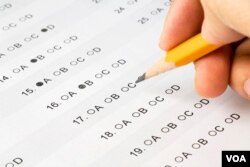The eighth in a series looking at U.S. life and culture through its idioms. View previous entries.
When I first decided to apply for grad school, I never expected to find what feels like a huge obstacle for my future plans. As an international student, I have had to take standardized tests many times in the past, so I thought I would succeed in scoring high in the GRE if I worked as hard as I had before. But when I first sat down to take a diagnostic test, although I did quite well in the Verbal Reasoning section, I literally stunk in the Quantitative Reasoning one. After doing a lot of revision and practice, I am still doing as poorly as I had done the first time.
You plan your schedule, dedicate time to attaining your goals, study hard, practice regularly, and you still don’t progress as fast or as far as you expect! What do you do? You learn to cope with frustration and to make the most of the reality. That’s what I'm doing, and I think it is a very valuable lesson I am learning.
So here I am, still studying my hardest for this often dreaded examination, but also moving on in the process of applying for grad school with the reality of my situation in mind. These strategies have been helping me keep going – accepting the frustration without letting it derail me.
Start with a plan but prepare for surprises
When I decided I wanted to apply for grad school, I developed a plan. I would use my time in the United States to research schools I would like to apply to, and maybe visit some of them if I could find the time and money to travel.
I was able to pinpoint the schools offering what I am looking for, and I visited a couple of those schools and met a few people there. I even had the fantastic opportunity to serve as an interpreter for a professor from one of those schools at a UN conference!
Having this plan put me on the right track to move my applications forward. I got good recommendation letters and talked with a professor who gave me guidelines on writing my personal statements.
According to my plan, I was going to focus on the GRE once I got back home in June. Unfortunately, I found out that the GRE is not offered back home. I could take it in a neighboring country, but the next date available would be December, which would be too late, since most applications are due in December and January. That left me suddenly having to take the exam in the States, and months before I had anticipated, leaving me much less time to focus on studying than I had initially anticipated or hoped for.
But planning ahead meant that by the time I realized the GRE was going to be a serious roadblock, I was well on my way with the other application components and didn’t have to stress about them as much, leaving me more time to focus on the GRE in the short time I have left to study.
Practice, practice, practice
I have borrowed reference books from the library, bought practice test books, downloaded free practice tests and exercises from different web resources, watched online videos with explanations of the concepts and example problems being worked out, read forums discussing the most efficient ways to tackle problems. And the list goes on and on. I never stop practicing.
Yes, it’s frustrating when the practicing doesn’t pay off as much as you think it should, but I do feel like I am making progress in my test-taking. And I feel empowered that I don’t have to accept my results without a fight.
Reach out
One of the strategies that has helped me the most is to reach out to other people. More people than you might think know about what you need to learn, and more often than you expect, they are very willing to help.
One day, I posted on Facebook about a math problem that was killing me; I was just expressing my frustration about it, but I got tons of comments back helping me solve the problem. That triggered me to contact friends and co-workers who are helping me understand the concepts I’m having a hard time with and solve the math problems that I’m beginning to loathe!
It’s not just in studying for the GRE where help has come from unexpected places, once I thought to ask for it. One of the most helpful resources I have found—and I hadn’t thought of—was the Career Development Center at the college I’m working for. There I meet with specialists every other week to work on my resume and other crucial steps I need to take before actually applying to school.
Think outside the box
My strategies for improving my performance are not limited to the exam itself; there are other things I do in my everyday life that I believe have an impact on how well—or badly—I perform. I exercise (almost) everyday; that way I get tired, sleep better and wake up with renewed energy to keep on working. I eat healthily; I get lots of fruits and vegetables for my vitamins and sugar, and I eat other kinds of carbs to keep me going (fruits and veggies are carbs, but I also eat whole grains, which keep you boosted).
I drink mate, a beverage from back home that keeps me awake and reminds me of how I studied back home. I take breaks to talk to friends, to work on a different thing, or to procrastinate on Facebook. I use aromatherapy; yes, peppermint or rosemary for concentration, and lemon or lemongrass for creative thinking. I could go on, but I’m sure you get the idea.
Make reality work to my advantage
While I am giving my all studying for the GRE, I am also aware of the fact that I have a very short time to prepare for this exam, and that I might not do as well as I want to strengthen my chances to get into grad school, particularly into some of the schools I chose to apply to. However, I will not let that tear me down.
I know what my strengths and weaknesses are, and there are other aspects of the application process that might compensate for a less-than-optimal GRE score; for instance, my personal statement, which is where I can focus on my assets rather than on my liabilities. It is where I can show what’s unique about me and where I can express not only how I would benefit from entering the program, but also what the school would gain from having a student like me.
I feel that writing a strong personal statement that tells who I am and where I am going could be my chance at getting in at least some of the schools. But just in case, I am also making sure I have a variety of schools to apply to, paying attention to the program itself but also to acceptance rates, number of international students accepted and other statistics.
Never give up
This is what I most deeply believe in, and all of my other strategies are based on the fact that I believe in myself. I trust that I can do it. This is my way to deal with frustration. Being self-confident is very important for me, not just for this exam in particular, but about my life in general.
I trust that I can accomplish whatever goals I set for myself. This doesn’t mean at all that I never fail; it means that I don’t see my setbacks as failures, I just see them as instances in my life to learn from. I truly believe that whatever obstacle we face, however painful, is ultimately an instance to make us stronger. That’s why I’m not giving up on this GRE killer! I will endure and I will use all the tricks up my sleeve to get as good as I can in the short time that I have, and then move on from there.
Editor: Shree Raj Shresta
Dang it = Exclamation to express frustration or anger, a more polite version of "damn it"
Applying to graduate school is a long and complex process that begins well before you actually send in an application. While some of the steps flow easily, inevitably at least one will complicate your life; for me that one has been the Graduate Record Examination (GRE).When I first decided to apply for grad school, I never expected to find what feels like a huge obstacle for my future plans. As an international student, I have had to take standardized tests many times in the past, so I thought I would succeed in scoring high in the GRE if I worked as hard as I had before. But when I first sat down to take a diagnostic test, although I did quite well in the Verbal Reasoning section, I literally stunk in the Quantitative Reasoning one. After doing a lot of revision and practice, I am still doing as poorly as I had done the first time.
You plan your schedule, dedicate time to attaining your goals, study hard, practice regularly, and you still don’t progress as fast or as far as you expect! What do you do? You learn to cope with frustration and to make the most of the reality. That’s what I'm doing, and I think it is a very valuable lesson I am learning.
So here I am, still studying my hardest for this often dreaded examination, but also moving on in the process of applying for grad school with the reality of my situation in mind. These strategies have been helping me keep going – accepting the frustration without letting it derail me.
Start with a plan but prepare for surprises
When I decided I wanted to apply for grad school, I developed a plan. I would use my time in the United States to research schools I would like to apply to, and maybe visit some of them if I could find the time and money to travel.
I was able to pinpoint the schools offering what I am looking for, and I visited a couple of those schools and met a few people there. I even had the fantastic opportunity to serve as an interpreter for a professor from one of those schools at a UN conference!
Having this plan put me on the right track to move my applications forward. I got good recommendation letters and talked with a professor who gave me guidelines on writing my personal statements.
According to my plan, I was going to focus on the GRE once I got back home in June. Unfortunately, I found out that the GRE is not offered back home. I could take it in a neighboring country, but the next date available would be December, which would be too late, since most applications are due in December and January. That left me suddenly having to take the exam in the States, and months before I had anticipated, leaving me much less time to focus on studying than I had initially anticipated or hoped for.
But planning ahead meant that by the time I realized the GRE was going to be a serious roadblock, I was well on my way with the other application components and didn’t have to stress about them as much, leaving me more time to focus on the GRE in the short time I have left to study.
Practice, practice, practice
I have borrowed reference books from the library, bought practice test books, downloaded free practice tests and exercises from different web resources, watched online videos with explanations of the concepts and example problems being worked out, read forums discussing the most efficient ways to tackle problems. And the list goes on and on. I never stop practicing.
Yes, it’s frustrating when the practicing doesn’t pay off as much as you think it should, but I do feel like I am making progress in my test-taking. And I feel empowered that I don’t have to accept my results without a fight.
Reach out
One of the strategies that has helped me the most is to reach out to other people. More people than you might think know about what you need to learn, and more often than you expect, they are very willing to help.
One day, I posted on Facebook about a math problem that was killing me; I was just expressing my frustration about it, but I got tons of comments back helping me solve the problem. That triggered me to contact friends and co-workers who are helping me understand the concepts I’m having a hard time with and solve the math problems that I’m beginning to loathe!
It’s not just in studying for the GRE where help has come from unexpected places, once I thought to ask for it. One of the most helpful resources I have found—and I hadn’t thought of—was the Career Development Center at the college I’m working for. There I meet with specialists every other week to work on my resume and other crucial steps I need to take before actually applying to school.
Think outside the box
My strategies for improving my performance are not limited to the exam itself; there are other things I do in my everyday life that I believe have an impact on how well—or badly—I perform. I exercise (almost) everyday; that way I get tired, sleep better and wake up with renewed energy to keep on working. I eat healthily; I get lots of fruits and vegetables for my vitamins and sugar, and I eat other kinds of carbs to keep me going (fruits and veggies are carbs, but I also eat whole grains, which keep you boosted).
I drink mate, a beverage from back home that keeps me awake and reminds me of how I studied back home. I take breaks to talk to friends, to work on a different thing, or to procrastinate on Facebook. I use aromatherapy; yes, peppermint or rosemary for concentration, and lemon or lemongrass for creative thinking. I could go on, but I’m sure you get the idea.
Make reality work to my advantage
While I am giving my all studying for the GRE, I am also aware of the fact that I have a very short time to prepare for this exam, and that I might not do as well as I want to strengthen my chances to get into grad school, particularly into some of the schools I chose to apply to. However, I will not let that tear me down.
I know what my strengths and weaknesses are, and there are other aspects of the application process that might compensate for a less-than-optimal GRE score; for instance, my personal statement, which is where I can focus on my assets rather than on my liabilities. It is where I can show what’s unique about me and where I can express not only how I would benefit from entering the program, but also what the school would gain from having a student like me.
I feel that writing a strong personal statement that tells who I am and where I am going could be my chance at getting in at least some of the schools. But just in case, I am also making sure I have a variety of schools to apply to, paying attention to the program itself but also to acceptance rates, number of international students accepted and other statistics.
Never give up
This is what I most deeply believe in, and all of my other strategies are based on the fact that I believe in myself. I trust that I can do it. This is my way to deal with frustration. Being self-confident is very important for me, not just for this exam in particular, but about my life in general.
I trust that I can accomplish whatever goals I set for myself. This doesn’t mean at all that I never fail; it means that I don’t see my setbacks as failures, I just see them as instances in my life to learn from. I truly believe that whatever obstacle we face, however painful, is ultimately an instance to make us stronger. That’s why I’m not giving up on this GRE killer! I will endure and I will use all the tricks up my sleeve to get as good as I can in the short time that I have, and then move on from there.
Editor: Shree Raj Shresta







